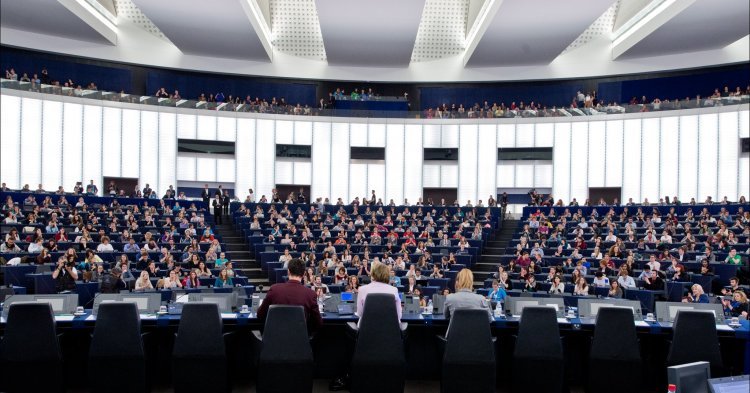The paradox of the next European elections
01 May 2019 /

This article is a contribution by our partners The New Federalist,written by Riccardo Moschetti.
The elections to the European Parliament will commence in less than 30 days. Due to the Brexit extension granted to the UK, for the first time in history we won’t know how many MEPs will be elected to the European Parliament until the day before the elections. At the same time, it was the European Council that finally decided on the composition of the Parliament.
At the moment, there are 750 members of the European Parliament, plus the President, and as the Treaty of the European Union establishes, it is the maximum number of MEPs we can have. [1] The UK’s scheduled withdrawal from the EU prompted a rethink on how their 73 seats should be redistributed.
Who has the power to change the rules?
In June 2018 the European Council (EC), a body which quite paradoxically has the power to modify the composition of the Parliament, had three options in front of it: a) Reconsidering on the proposal, rejected by the EP itself, to create the so-called ‘transnational lists’ (the idea was to assign those 73 seats to a European-wide constituency) ; b) to reduce the amount of MEPs from 750 to 677, thus removing all UK seats, (this choice would have been the easiest one and also the easiest to defend, considering that the EU could have employed the “cutting the costs of politics” rhetoric); or c) adopting option B with some adjustments, thus cutting the total number of the seats on one hand, and redistributing a part of the seats to some Member States on the other.
The European Council adopted option ‘c’, so the next Parliament will be composed by 705 MEPs and some of the member States saw an increase in the number of their MEPs. More or less a year before the 2019 elections, the EU institutions reacted well in order to establish how they will work without the UK, respecting the minimum time proposed by IDEA (International Institute for Democracy and Electoral Assistance), namely a minimum of one year to change the rule of the general elections.
This non-binding rule is a very important aspect in securing a democratic system. Modifying one of the components of a political system, the electoral procedure (even if there is no proper European-wide electoral law) of the institutions has important consequences, even more so if the institution who changed the rule is not the one that will be affected. In a high-quality democracy, it is the party system that is the actor with the legitimacy to change, renew and modify how rulers will be chosen by the voters throughout a democratic decision.
Most of the time, due to the fact that confidence in political parties and in politics in general is a rather negative trend, we forget that parties are composed by the people; they preserve a specific social capital and they have to represent a political culture and interests. It means that political parties can (best) work only via consensus. It is definitely not the same for the institutions. After all, it is the actual party and the public who have to establish their ‘rules’ in the best possible way.
These are the sort of things that an efficient party system should do and it is quite clear that the European party system is too different from what it should actually be like. Above all, the next EP elections will be fundamental because a crossroads is becoming more likely every single day. These elections are an important occasion not only because they seem to be real ‘European’ elections, or because there will be a face-off between nationalists and populist forces and all the other ones, but especially because the EP itself could gain or lose a lot of its power and influence in the EU institutional framework.
With or without UK
The European Council on Foreign Relations (ECFR) recently published an article aiming to forecast the next Parliament, both with and without the British MEPs.
Based on the article, one can first observe that the possible fragmentation of the EP groups could be reduced or even avoided if the UK participates in the elections. Basically all the groups we can now see in the EP will remain the same (apart from the nationalists). On the contrary, if the UK doesn’t participate, the fragmentation rate will be higher. The EFDD is a group that will no longer exist without Nigel Farage’s party and the ECR, which could truly make a difference in the coalitions’ structure (even acting as a moderator amongst nationalists), would lose the British Conservatives.
Secondly, even if with UK participation, it seems that no strong majority can be formed, the solid presence of moderate groups can make a difference, especially with regard to the process of electing the new Commission President. Still, if we have to take a look at the Spitzenkandidaten process, it is clear that the system does not properly work. Perhaps the most pro–European group, ALDE, was under pressure by President Macron and did not nominate a single lead candidate.
If the EP political parties don’t find an agreement in order to propose a strong candidate to the Commission, this non-written and non-binding procedure could be abandoned in the next elections.
Footnotes
[1] Article 14 of the TEU (Treaty of the European Union) clarifies that «the total number of the members is not to exceed 750, plus the President, that representation is to be degressively proportional, with a minimum threshold of six members per State, and that no member States is to be allocated more than 96 seats». Germany has 96 seats.
